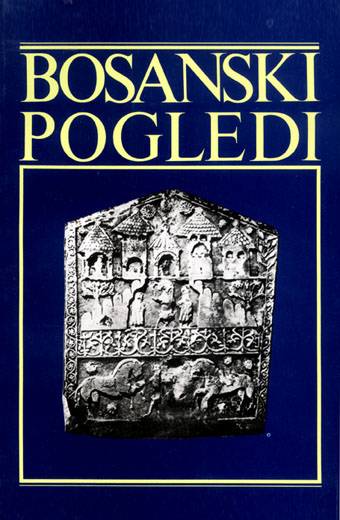Bosnian Views was an emigrant magazine of Bosnian Muslims. The collection of the magazine can be found in the library of the Bosniak Institute – Adil Zulfikarpašić Foundation in Sarajevo. The term
Bosniak refers to South Slavs identifying with Bosnia and Herzegovina and whose culture is further defined by Islam. However, Bosniaks do not necessarily refer to Islam in this case as religion, but rather as particular traditions and culture, and to the multi-national state of Bosnia and Herzegovina.
The journal Bosnian Views was not published continuously from the start. The first issue came out in 1955, edited by Smail Balić. The second was released on August 15, 1960, when Adil Zulfikarpašić took over editing. The journal was regularly published from 1960 to 1964, when 44 issues were produced.
During the 1960s in Yugoslavia, Bosnian Muslims became a distinct political group, next to Bosnian Serbs and Bosnian Croats, forming part of the multi-national make-up of Socialist Bosnia and Herzegovina. During this time, the state began to differentiate between Muslims with a capital “M” and muslims with a small “m”. Muslims with a capital “M” referred to Bosnian Muslims as a socialist national group (in the Marxist understanding of a nation as a socio-economically developed group identity with sovereign political rights). Muslim with a small “m” referred to an identity reduced to religion, hence primarily understood through Islam as faith (and not in a broader sense through culture).
This complicated solution was a way to answer the quest of Bosnian Muslims for equal political consideration beside Bosnian Serbs and Bosnian Croats. But it also paved the way for deeper religious exploitation of “Bosnianhood” by religious leaders which accelerated when Yugoslavia disintegrated. Since the wars of Yugoslavia’s disintegration in the 1990s, instead of “Bosnian Muslims” the term “Bosniaks” has been used.
Bosnian Views was intended for Bosnian and Herzegovinian Muslim emigrants, and it strove to keep its readership informed of political and social events. Furthermore it examined academic texts (on religious, political, and historical topics), and took part in the democratic trends of the European social and political thought of liberal profiling. The identity of the magazine evolved from a “Muslim political newsletter” to becoming the voice of emigré Bosnian Muslims’ national awareness. The goal of the editorial board was to explain its views to the West and to the Bosnian and Herzegovinian diaspora worldwide through formal educational, cultural, and political texts regarding their homeland, the Socialist Republic of Bosnia and Herzegovina within Yugoslavia.
Many aspects of how the editors approached contemporary history were harshly criticized by the Yugoslav regime, and thus its police and political structures were quite hostile to the magazine. In 1963, the state secret services created a fake issue which was particularly hostile towards Croats and Serbs, fellow national groups living alongside Bosnian Muslims within the Socialist Republic of Bosnia and Herzegovina (see “Featured Item”). In the diaspora the paper was well received, judging from the polemics and reactions of its readers. It presented itself as a leaflet for cultural and political issues of Bosnian Muslims, with full autonomy and awareness of their own national and state interests, acting in the political space between Croatian and Serbian emigrés.
Iva Lučić argued that “[t]he political process of acknowledging the Muslim community as one of the three constitutive nations in the Socialist Republic of Bosnia and Herzegovina was the result of a political mobilization that began during the 1950s and was initiated and promoted by the League of Communists of Bosnia and Herzegovina (SK BiH). As a strategic choice on the part of the republic’s political leaders, it represented the attempt to affirm and legitimize its status as a sovereign republic within the joint state. In the context of a decentralizing Yugoslav Federation with its economically competing mono-national republics, Muslims became a political resource: The SK BiH needed them to prove the unique multinational nature of its republic compared with the other political entities of Yugoslavia – portraying it as a political entity founded in the tripartite structure of Serbs, Croats, and Muslims.” (Lučić 2016, 311–2). Bosnian Views must be regarded in this context: the journal was not anti-communist, but rather an anti-regime medium, which condemned contemporary communist and dictatorial political practice (not the idea). The journal was critical towards particular phenomena, ranging from the political repression and prohibition of free speech, to certain antifascist movements among the urban Muslim population during WWII, to women’s position and role in communist and Yugoslav society, but it did not attack Yugoslavia as a state.
The collection has been used by and is open to researchers and journalists from Bosnia and Herzegovina and abroad. According to the head librarian Narcisa Puljek-Bubrić, the collection has not been exploited by politicians.

